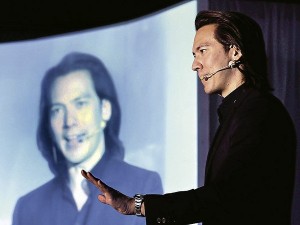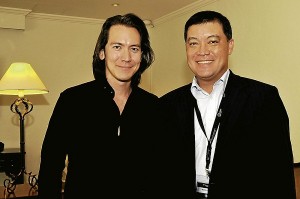Future lies in humans’ relationship with technology
For the average Filipino, the most interesting thing about Mike Walsh could be that he used to date model Georgina Wilson.
But for Walsh, that relationship is a thing of the past. As a self-proclaimed futurist, he says he tends to concern himself with what lies ahead.
Walsh is the author of the recent book “Futuretainment,” which many can consider a manual for how companies can cope in a world transformed by “consumer connectedness.”
“I consider myself a futurist. But I’m also an anthropologist,” he says in a recent interview with SundayBiz. What exactly does he mean, one might ask? “I do this to help companies embrace change,” he says.
Walsh was recently in Manila to deliver the key note speech at the Enterprise Innovation Forum sponsored by Ayala-led Globe Telecom, the country’s second largest phone firm.
What Walsh wants companies to understand is that in today’s Internet-powered world, consumers are now more empowered, giving them the unprecedented ability to access information and share opinions about products at the push of a button.
Walsh says making the book, which looks more like a photo album than something a big-shot CEO would have on his desk, relied heavily on the Internet and digital technology.
He describes it as “a book about the end of traditional media.”
“The ironic thing about this book is that it’s actually a book, not an e-book or anything digital,” he says. “I’m really an analogue guy and I already have a lot of content published online,” he says.
“What’s funny is that we were creating an analogue product using digital techniques. We were processing photos digitally. I worked with a design team and we all collaborated with each other through Flickr,” Walsh says.
He says the new book has already won several visual design awards in New York City, one of the world’s capitals for art. It is now also displayed in the famous Museum of Modern Art (MoMA) in Manhattan.
In the same way that he made his book, he said companies need to find new ways to interact with their consuming public. “This is how companies are going to engage with customers and consumers of the future,” he says.
And it’s not just a competition of how many people “Like” your company’s page on Facebook. “The more important insight is how your consumers are connected to each other,” Walsh says.
By taking a deeper look into consumer data on the Internet and on social networks, companies can find new “patterns of consumer behaviour” that would not have been able to observe in the past.
Walsh says the most valuable asset in the world of business today is information, which give companies insight to the fickle minds of modern-day consumers.
“Data used to be thought of as an expense for companies because they had to shell out for storage equipment and IT administrators. But companies are realizing that they have to collect data because it can be a competitive advantage,” he says.
Walsh says Futuretainment explores the many ways that newly available data can be used to a company’s advantage.
In one case, he says multinational personal products manufacturer Proctor & Gamble recently found out that its dental care products, while already popular for most any kind of consumer, has gained a loyal fan base among a very specific niche: zookeepers.
“They found out that zookeepers use their toothbrushes and other products to clean walrus teeth,” he says. He says this was just one of the many little things that most companies did not know about their own products.
He says firms should use this new information to continue innovating and adapting to the needs of consumers.
“Innovation used to be a luxury, something you invest in when times are good. But today, companies need to give more money to their innovators,” he says.
Walsh adds this was what he has learned, not by spending years in a classroom but by devoting a significant part of his life to understanding how technology has really changed the world.
While he spends a lot of time in New York City, he shares his home at the moment is in Istanbul, Turkey. “I try to force myself to live in a new place every few years,” he says, as part of his mission of understanding as much about the world as there is to understand.
“It was while working in Asia over the last few years that my eyes were finally opened to what was coming,” he says in his book.
“Here, subway commuters were already watching television on tiny handsets, teenagers were becoming addicted to gaming in virtual worlds, best-selling novels were being composed entirely on mobile phones and the success of a new generation of pop stars was fluctuating in step with fickle tastes in ringtones and digital merchandise,” he cites.
He says the future was no longer about producing the next shiny gadget, but about the change in humanity’s relationship with technology.
“People are becoming more connected, more networked,” he says adding that companies used to have a monopoly on the information available about products in the market.
Today, consumers can exchange information about products between themselves. As a result, one bad online review on a product can ruin a year’s worth of planning to market that said product.
Because of this changing environment, he says “CEOs that will survive are the adaptable ones. The ones with no fixed views and are not locked down by markets or customer definitions.”


